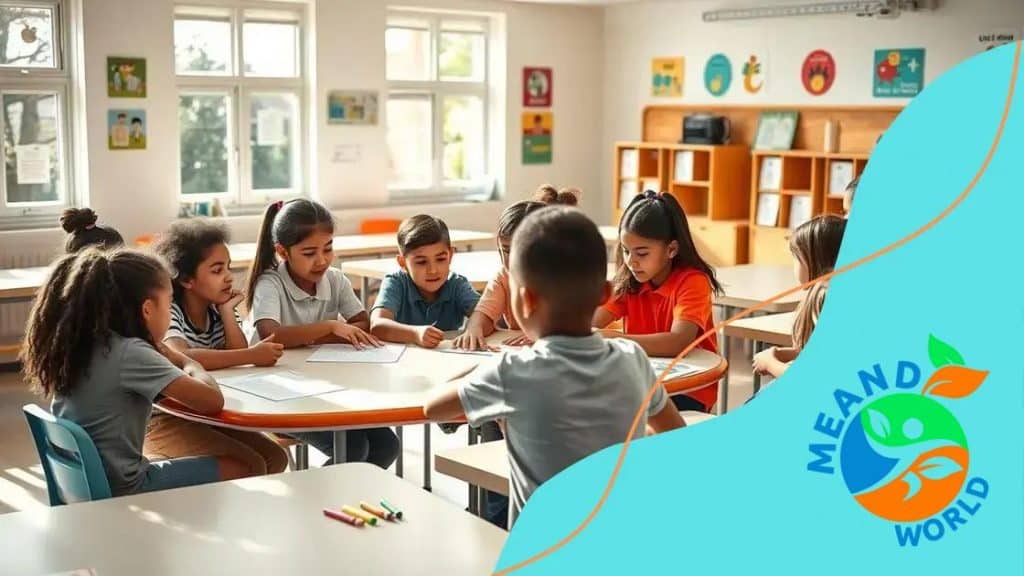The importance of soft skills training in modern education

Anúncios
The importance of soft skills training in modern education lies in its ability to enhance students’ communication, teamwork, and problem-solving abilities, ultimately preparing them for success in both academic and professional environments.
The importance of soft skills training in modern education is becoming increasingly clear. In a fast-paced world, students benefit greatly from developing these essential skills. Have you ever wondered how soft skills can shape their future opportunities?
Anúncios
Understanding soft skills and their relevance
Understanding soft skills and their relevance is essential in today’s educational landscape. Soft skills, such as communication, teamwork, and empathy, play a crucial role in shaping a student’s future. These skills are not just beneficial; they are increasingly vital for success in various fields.
Anúncios
What Are Soft Skills?
Soft skills refer to personal attributes that enable someone to interact effectively and harmoniously with others. Unlike hard skills, which are job-specific abilities, soft skills are more about how we connect with people.
Importance of Soft Skills
Integrating soft skills into education helps prepare students for real-world challenges. Here are some key reasons why they matter:
- Enhance communication: Students learn to express their thoughts clearly.
- Promote teamwork: Collaborating with peers builds a sense of community.
- Encourage adaptability: Students learn to navigate change effectively.
- Foster problem-solving: Creative thinking is essential for innovative solutions.
By emphasizing soft skills, educators can help students develop a well-rounded skill set. This balanced approach supports academic learning and equips students for their future careers.
Incorporating soft skills training in the classroom also helps create a positive school environment. It fosters emotional intelligence, leading to better relationships among students and teachers. For instance, students who practice empathy are more likely to form supportive friendships.
Moreover, soft skills enhance employability. Employers increasingly value candidates who can work well in teams and communicate effectively. By addressing these skills in education, we can ensure that students are not only academically prepared but also ready for the workforce.
Key soft skills for students to develop
Key soft skills for students to develop are essential for success in both school and future careers. These skills help students navigate social interactions and work effectively with others. Let’s explore some of the most important soft skills that can enhance a student’s learning experience.
Communication Skills
Effective communication is a foundational skill. Students must learn to express their ideas clearly and listen actively. This can lead to better collaboration with peers, teachers, and future colleagues.
Teamwork and Collaboration
Teamwork is vital in today’s educational settings. Participating in group projects encourages students to share ideas and respect differing opinions. This environment fosters an inclusive culture.
- Builds trust among team members.
- Teaches conflict resolution strategies.
- Promotes accountability and responsibility.
These experiences prepare students for real-world scenarios where teamwork is often required. As they work together, they learn how to depend on each other to achieve common goals.
Problem-Solving Skills
Another crucial skill is problem-solving. Students learn to assess situations, think critically, and find creative solutions. This ability is invaluable as they face challenges in both academic and personal contexts.
Adaptability
In a rapidly changing world, being adaptable is essential. Students who develop this skill are more likely to embrace change and remain resilient in the face of setbacks. This flexibility can lead to greater success in various aspects of life.
When students learn to view challenges as opportunities for growth, they cultivate a positive mindset. This approach not only benefits their education but also prepares them for future uncertainties.
Finally, emotional intelligence, which involves understanding and managing one’s emotions, is a key component of soft skills. It enhances interpersonal relationships and helps students navigate social situations with empathy.
Benefits of integrating soft skills in curricula

Integrating soft skills in curricula offers numerous benefits for students. These skills enhance not only academic performance but also prepare students for future challenges in their careers. Let’s explore the ways that soft skills training can impact student growth.
Improved Academic Performance
When students develop soft skills like communication and teamwork, their ability to work effectively in group projects improves. This collaboration leads to better academic outcomes as students learn to support one another and share knowledge.
Enhanced Career Readiness
Incorporating soft skills into education helps students become more marketable to future employers. Companies are looking for candidates who can work well in teams, adapt to changing environments, and communicate effectively. By fostering these skills in the classroom, teachers prepare students for the workplace.
- Employers value emotional intelligence.
- Strong communication reduces misunderstandings.
- Problem-solving skills are essential for innovation.
As these skills are nurtured, students become more confident in their abilities. This confidence can carry over into job interviews and professional settings, making them distinct candidates in competitive job markets.
Stronger Interpersonal Relationships
Another significant benefit is the cultivation of stronger interpersonal relationships among students. Learning to engage with peers through empathy and active listening fosters a supportive classroom culture. This positive environment encourages students to express their thoughts freely.
When students practice teamwork and collaboration, they learn invaluable lessons about respecting diverse perspectives. This exposure builds a sense of community and belonging among classmates. These relationships are crucial as students develop lifelong social skills.
Moreover, integrating soft skills can lead to reduced behavioral issues. When students feel understood and valued, they are less likely to engage in disruptive behavior. This creates a more focused and productive classroom experience.
Challenges in implementing soft skills training
Implementing soft skills training in education comes with several challenges. These hurdles can affect how effectively students acquire these essential skills. Understanding these challenges is crucial for creating effective training programs.
Lack of Resources
Many schools face budget constraints, limiting their ability to provide dedicated soft skills programs. Without adequate funding, teachers may lack the tools and materials needed to integrate these skills into their lessons.
Insufficient Training for Educators
Another challenge is the need for comprehensive training for educators themselves. Teachers often require specific training to effectively teach soft skills. When educators are not equipped with the right skills or strategies, they may struggle to foster these abilities in their students.
- Professional development programs are often lacking.
- Teachers may be unaware of effective teaching methods.
- Ongoing support is rarely provided.
This lack of training can lead to inconsistent soft skills education across different classrooms. Additionally, educators may feel unprepared to assess students’ softer skills, making them hesitant to engage in this teaching.
Resistance to Change
Implementing any new curriculum can face resistance from both faculty and parents. Some educational stakeholders might believe that hard skills are more important than soft skills. This mindset can hinder the integration of effective training programs.
Moreover, traditional assessment methods often prioritize core subjects over soft skills, leading to skepticism about their value. Shifting this perspective is essential for changing how education systems prioritize these skills.
Finally, time constraints in the school day pose another significant challenge. With fixed schedules, teachers may prioritize academic content over the softer skills that could benefit students in the long term.
Measuring the impact of soft skills education
Measuring the impact of soft skills education is essential for understanding its effectiveness in student development. Accurate assessments help educators determine if their methods are working and how they can improve.
Importance of Assessment
Regular assessment of soft skills can provide valuable insights into students’ progress. Unlike traditional subjects, soft skills are often harder to quantify. However, a variety of methods can be used to track growth.
Methods of Measurement
Some effective methods for measuring soft skills education include:
- Surveys and questionnaires that gather feedback from students about their confidence and experiences.
- Peer evaluations that allow students to assess each other’s teamwork and communication abilities.
- Teacher observations noting behavioral changes and participation in group activities.
These methods can give a clearer picture of how soft skills are developing within the classroom environment. Additionally, incorporating reflections or self-assessments can encourage students to think critically about their own growth.
Long-Term Impact
It’s also important to analyze the long-term impacts of soft skills training. Tracking graduates’ success in higher education and the workplace can help illustrate the lasting benefits of these skills. For example, studies show that students with strong soft skills often excel in college and attract more job offers.
Furthermore, organizations and schools can collaborate to survey employers about the effectiveness of their soft skills training. This feedback can help shape future curricula and focus areas for improvement.
Incorporating both quantitative and qualitative measures will create a comprehensive approach to evaluating soft skills education. By doing so, educators can ensure they are fostering the necessary skills that students will use throughout their lives.
FAQ – Frequently Asked Questions About Soft Skills Training in Education
What are soft skills?
Soft skills are personal attributes like communication, teamwork, and problem-solving that help individuals interact effectively and harmoniously with others.
Why is soft skills training important in education?
Soft skills training is crucial as it prepares students for real-world challenges, enhances academic performance, and makes them more employable.
How can teachers measure the impact of soft skills education?
Teachers can use surveys, peer evaluations, and teacher observations to assess student progress in developing soft skills.
What challenges do schools face in implementing soft skills training?
Schools often encounter issues such as lack of resources, insufficient training for educators, and resistance to change from stakeholders.





